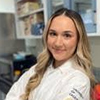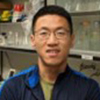Charles L. Bevins, M.D., Ph.D.

Professor
GBSF Room 5515
Davis Campus
530-754-6889
e-mail
- Characterization of Antimicrobial Peptides from Human and Rodent Mucosal Tissues
- Study of the Regulated Expression and Processing of Antimicrobial Peptides
- In vivo models of defensin activity
- Altered Expression of Antimicrobial Peptides in Inflammatory Bowel Disease, Otitis Media, and Necrotizing Enterocolitis
Our laboratory is interested in innate immunity of mucosal tissues and we are focused on a key effector component of host defense: antimicrobial peptides. Antimicrobial peptides are endogenous antibiotics, isolated from diverse species throughout the plant and animal kingdoms. They represent an evolutionary ancient mechanism of host defense. These peptides have a broad-spectrum of antimicrobial activity that includes bacteria, fungi and certain viruses. Additional biological activities of many antimicrobial peptides (for example, chemotaxis) are a result of high affinity interactions with various cell surface receptors. Defensins are the major class of antimicrobial peptides in humans and other mammals. Recent work from our laboratory has discovered that certain defensins are expressed in abundance by epithelial cells at wet mucosal surface. The long-range goal of our research is to understand the specific role that these epithelial antimicrobial peptides play in mucosal host defense and to characterize the pathophysiology that characterizes altered expression of these peptides.
Although the epithelia of mammalian mucosal tissues were once regarded as a primarily a passive barrier to noxious agents, our studies support a model: Antimicrobial peptide constitutes part of an active, early host defense response of challenged epithelial cells. Our current collaborative studies include: (i) characterizing the primary structure and biological activity of the tissue forms defensins, (ii) defining the key regulatory steps for the expression of these molecules, (iii) exploring potential mechanisms of therapeutic modulation of these systems. The investigations include biochemical and molecular biological approaches and analysis of transgenic and other animal models.
Clevers, HC and Bevins, CL: Paneth cells: maestros of the small intestinal crypts. Annu Rev Physiol 75: 289-311, 2013.
Chu, H, Pazgier, M, Jung, G, Nuccio, S-P, Castillo, PA, de Jong, MF, Winter, MG, Winter, SE, Wehkamp, J, Shen, B, Salzman NH, Underwood, MA, Tsolis, RM, Young, GM, Lu, W, Lehrer, RI, Bäumler, AJ, and Bevins, CL: Human α-defensin 6 promotes mucosal innate immunity through assembled peptide nanonets. Science 337:477-481, 2012.
Tollner TL, Bevins CL, Cherr GN: Multifunctional glycoprotein DEFB126-a curious story of defensin-clad spermatozoa. Nat Rev Urol. 9:365-375, 2012.
Tollner, TL, Venners, SA, Hollox, EJ, Yudin, AI, Liu, X, Tang, G, Xing, H, Kays, RJ, Lau, T, Overstreet,, JW, Xu, X, Bevins, CL*, Cherr, GN*: A common mutation in DEFB126 causes impaired sperm function and subfertility. Science Transl Med 3: 92ra65, 2011. (equal contributors)
Bevins, CL and Salzman, NH: The potter’s wheel: The host’s role in sculpting its microbiota. Cell Mol Life Sci 68:3675-3685, 2011.
Bevins, CL and Salzmann NH: Paneth cells, antimicrobial peptides and maintenance of intestinal homeostasis. Nat. Reviews Microbiol. 9: 356-368, 2011.
Winter, SE, Thiennimitr, P, Winter, MG, Butler, BP, Huseby, DL, Crawford, RW, Russell, JM, Bevins, CL, Adams, LG, Tsolis, RM, Roth, JR, and Bäumler, AJ. Gut inflammation provides a respiratory electron acceptor for Salmonella. Nature 467:426-429, 2010
Biswas, A, Liu, Y-J, Hao, L, Mizoguchi, A, Salzman, NH, Bevins, CL, and Kobayashi, KS Induction and rescue of Nod2-dependent Th1-driven granulomatous inflammation of the ileum. Proc. Natl. Acad. Sci. 107:14739-44, 2010
Bevins, CL and Liu, F-T A sweet target for innate immunity. Nat. Medicine 16: 263-264, 2010.
Salzman, NH, Hung, K, Haribhai, D, Chu, H, Karlsson-Sjöberg, J, Amir, E, Teggatz, P, Barman, M, Hayward, M, Eastwood, D, Stoel, M, Zhou, Y, Sodergren, E, Weinstock, GM, Bevins, CL, Williams, C and Bos, NA: Enteric defensins are essential regulators of intestinal microbial ecology. Nat Immunol 11: 76-82, 2010
Raffatellu, M, George, MD, Akiyama, Y, Hornsby, MJ, Nuccio, SP, Paixao, TA, Butler, BP, Chu, H, Santos, RL, Berger, T, Mak, TW, Tsolis, RM, Bevins, CL, Solnick, JV, Dandekar, S, and Baumler, AJ: Lipocalin-2 resistance confers an advantage to Salmonella enterica serotype Typhimurium for growth and survival in the inflamed intestine. Cell Host Microbe 5: 476-86, 2009.
Mukherjee, S, Partch, CL, Lehotzky, RE, Whitham, CV, Chu, H, Bevins, CL, Gardner, KH, and Hooper, LV: Regulation of C-type lectin antimicrobial activity by a flexible N-terminal prosegment. J Biol Chem 284:4881-8, 2009.
Yudin, AI, Tollner, TL, Treece, CA, Kays, RJ, Cherr, GN, Overstreet, JW, Bevins, CL: Beta-defensin 22 is a major component of the mouse sperm glycocalyx. Reproduction 136:753-65, 2008.
Hornsby, MJ, Huff, JL, Kays, RJ, Canfield, DR, Bevins, CL and Solnick, JV Helicobacter pylori induces an antimicrobial host response in rhesus macaques in a Cag Pathogenicity Island-Dependent Manner. Gastroenterology 134:1049-1057, 2008.
Bevins, CL and Liu, F-T Rosacea: Skin innate immunity gone awry? Nat. Medicine 13: 904-905, 2007
Baumgarth, N and Bevins, CL, Skin deep but complex. Nature 449:551-553, 2007.
Wehkamp, J, Wang, G, Kubler, I, Schaeffeler, E, Nuding, S, Gregorieff, A, Schnabel, Kays, RJ, Reinisch, W, Teml,, A, Vermeire, S, Rutgeerts, P, Fellermann, K, Burk, O, Clevers, H, Schwab, M, Bevins, CL and Stange, EF. The Paneth Cell alpha-Defensin Deficiency of Ileal Crohn's Disease is Linked to Wnt/Tcf-4. J. Immunol. 179:3109-3118, 2007.
McGillivary, G., Ray, W.C., Bevins, C.L., Munson Jr., R.S., Bakaletz, L.O., A member of the cathelicidin family of antimicrobial peptides is produced in the upper airway of the chinchilla and its mRNA expression is altered by common viral and bacterial co-pathogens of otitis media. Molec. Immunol. 44: 2446-2458, 2007.
Salzmann, NH, Underwood, MA, and Bevins CL, Paneth Cells, Defensins, and the Commensal Microbiota: A hypothesis on intimate interplay at the intestinal mucosa. Seminars in Immunology 19: 70-83, 2007.





